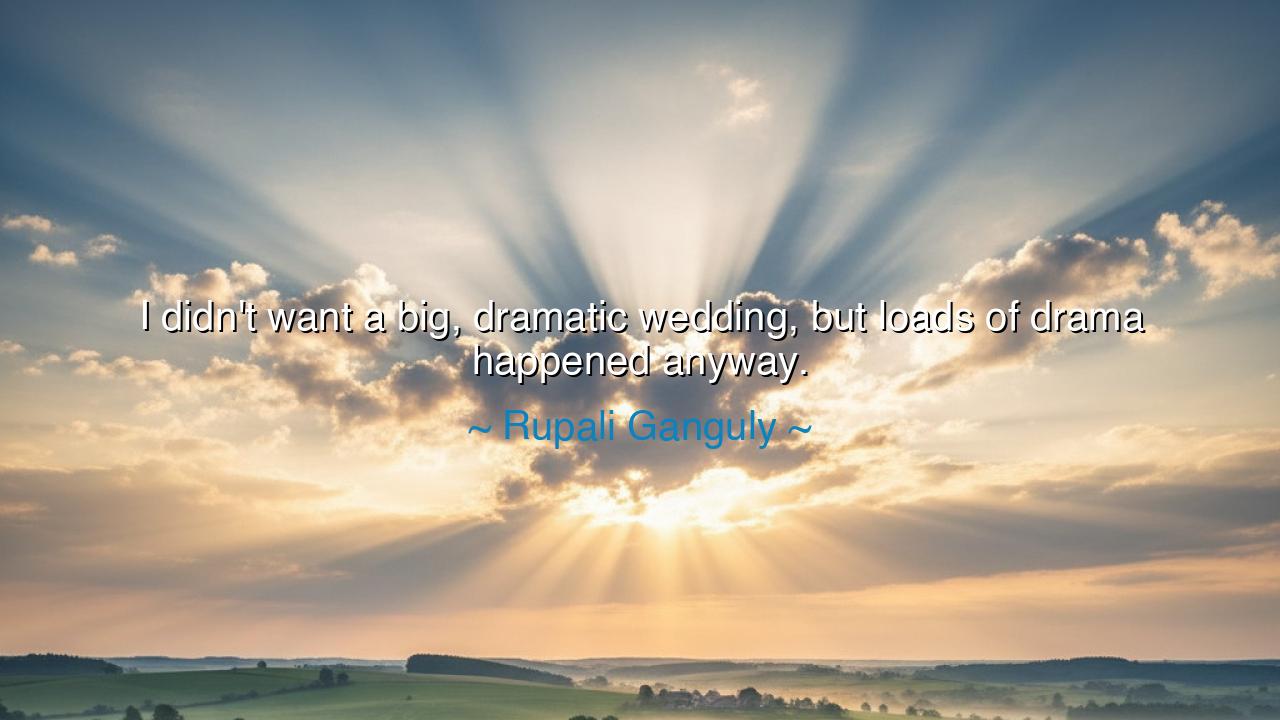
I didn't want a big, dramatic wedding, but loads of drama






Hearken, O children of the fleeting and the eternal, to the words of Rupali Ganguly, who speaks with the clarity of one who has glimpsed the paradox of expectation and reality. She sought a wedding of simplicity, a celebration unburdened by spectacle, yet found that drama, like an uninvited guest, arrived unbidden. Here lies the timeless lesson: even in our attempts to craft peace and order, the currents of human nature and circumstance often carry forth chaos beyond our design.
This utterance teaches that control is an illusion. From the ornate palaces of kings to the humble halls of common folk, mortals have long sought to dictate the flow of ceremonies and rituals, yet life, in its boundless complexity, often diverges from intent. Consider the wedding of Prince Charles and Lady Diana: envisioned as a moment of fairy-tale perfection, it became a stage for tension, misunderstanding, and public scrutiny, reminding all that even the grandest planning cannot restrain the tides of human emotion and circumstance.
Yet within this unpredictability lies a deeper wisdom: the measure of a wedding—or of any human endeavor—is not in the absence of drama, but in the ability to endure, to witness, and to find meaning amid the turbulence. Ganguly’s words echo the ancient teachings of Heraclitus, who proclaimed that change is constant, that the flow of life cannot be captured, only navigated. Acceptance becomes the path to serenity, even when the heart hoped for calm.
In every tale of celebration, there is a lesson of humility and resilience. One remembers the tales of Shakespeare’s kings, whose marriages were often filled with strife and intrigue, yet through which alliances and legacies were forged. So too does Ganguly remind us that drama, though unwanted, is a teacher: it sharpens patience, tempers expectations, and reveals the hidden strengths of those who endure it.
Let all who hear this teaching remember: the beauty of life does not lie in perfection, nor in the absence of discord, but in the courage to embrace the unfolding of events. The wedding, like life itself, is a mosaic of both joy and turbulence, each unexpected twist a thread in the tapestry of experience. In this recognition, the heart finds both wisdom and solace.
Thus, O seekers, hold fast to this counsel: strive for simplicity, yet prepare for complexity; seek serenity, yet honor the lessons of unexpected drama. For in the interplay between desire and reality, between plan and chance, lies the eternal dance of life, and the soul, tempered by experience, learns to flourish even amid the tempest.






DPDuong P
Rupali’s quote reflects a common theme that many people experience during weddings. You can plan for the simplest ceremony, but the day is always full of surprises. Do you think weddings are designed to be dramatic because they’re such a significant event, or is it the unpredictable nature of family, emotions, and expectations that always seems to stir things up?
HHHoai Ho
It’s interesting how Rupali describes her wedding. She wanted simplicity, but still, drama seemed inevitable. This raises an interesting point—how much does the pressure of a wedding day play into these dramatic moments? Could it be that we put so much energy into creating the ‘perfect’ day that it ends up becoming a breeding ground for drama and stress?
HBNguyen Huu Bao
This quote is a reminder that no matter how much we plan, life has a funny way of throwing in the unexpected. Rupali didn’t want a dramatic wedding, but drama found its way in anyway. What do you think causes this? Is it the emotional weight of weddings that leads to tension, or is it the pressure to have everything go perfectly that results in chaos?
GVGiap Van
Rupali’s take on her wedding day drama is both relatable and amusing. It makes me question: why is it that weddings often come with so much stress and unexpected drama? Even when we think we’re avoiding it, somehow, it still happens. Is this just part of the wedding process, or do we subconsciously create drama by placing so much importance on the day?
NMNguyet Minh
I can totally relate to what Rupali says here. No matter how much we try to keep things simple, weddings seem to bring out drama from all sides—whether it's family dynamics, last-minute changes, or uninvited surprises. Do you think weddings are inherently dramatic because of the pressure to make everything perfect, or do people just find themselves in situations that cause tension, no matter how much they plan?